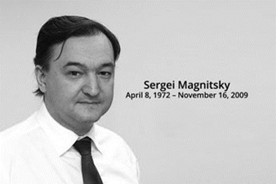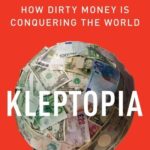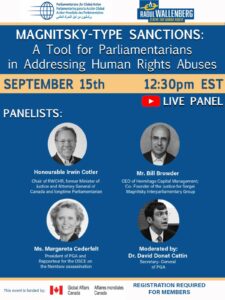After a journalist was assassinated, her sons found clues in her unfinished work that cracked the case and brought down the government, the New Yorker’s notes. Daphne Caruana Galizia was known for her reporting, which exposed malfeasance and hypocrisy within the governing class. In late 2016, Politico Europe included her on its list of “people who are shaping, shaking and stirring Europe” as “a one-woman WikiLeaks, crusading against untransparency and corruption in Malta, an island nation famous for both,” he writes:
 Matthew and Andrew reached out to Bill Browder (right), an American financier and political activist who had successfully lobbied Congress for sanctions against the Russian government, after it detained and killed his friend and colleague Sergei Magnitsky. “Do at least three things a day to annoy them,” Browder advised. “There are three of you. It shouldn’t be hard.” He noted that, after the Russian journalists Boris Nemtsov and Anna Politkovskaya were murdered, the Council of Europe, the Continent’s main human-rights body, appointed a special rapporteur to scrutinize the Russian system.
Matthew and Andrew reached out to Bill Browder (right), an American financier and political activist who had successfully lobbied Congress for sanctions against the Russian government, after it detained and killed his friend and colleague Sergei Magnitsky. “Do at least three things a day to annoy them,” Browder advised. “There are three of you. It shouldn’t be hard.” He noted that, after the Russian journalists Boris Nemtsov and Anna Politkovskaya were murdered, the Council of Europe, the Continent’s main human-rights body, appointed a special rapporteur to scrutinize the Russian system.
Press reports suggested that several European Union member states opposed its new human rights mechanism being called a “Magnitsky Act” so as not to stir problems with Russia. Yet, with human rights abuses worsening across the world, the EU clearly needed to upgrade its policy instruments, notes Carnegie analyst Richard Youngs. The key question is whether the EU will use its new regime frequently or only in a small number of cases, he writes:

Credit ESI
Political will is ultimately more important than specific procedural changes, however welcome the latter may be. The new regime does not, in itself, reflect any major strengthening commitment to democracy and human rights. The general trend in recent years has been toward a more cautious and even hands-off EU approach to these questions. Even when the EU has imposed restrictive measures, it has invariably targeted fewer individuals, with softer restrictions and for shorter periods of time, than the U.S. measures in each case.
Veto-proof majorities in the U.S. Congress have passed historic bipartisan anti-corruption legislation – the Anti-Money Laundering (AML) Act of 2020, filed as an amendment to the National Defense Authorization Act for 2021 – which lays the foundation for action on the presidential policy directive President-elect Joe Biden says he will issue to establish “combating corruption as a core national security interest and democratic responsibility,” adds analyst Ian Lynch.
Kleptocracy – the systemic theft of public funds by corrupt government officials – thrives on easy access to anonymous shell companies, luxury real estate, and other financial mechanisms primarily rooted in the United States and other consolidated democracies, he writes for The Diplomat:
 Able to secure their wealth beyond the reach of vengeful domestic forces, kleptocrats like former Kyrgyz President Kurmanbek Bakiyev and his son, Maxim Bakiyev, can flee to lavish lives in exile when their hold on power collapses. Although the United States eventually confiscated and returned $4.6 million in assets allegedly stolen by the younger Bakiyev to Kyrgyzstan, he appears to retain political asylum in Britain and lives in a $4.3 million mansion in a posh London suburb.
Able to secure their wealth beyond the reach of vengeful domestic forces, kleptocrats like former Kyrgyz President Kurmanbek Bakiyev and his son, Maxim Bakiyev, can flee to lavish lives in exile when their hold on power collapses. Although the United States eventually confiscated and returned $4.6 million in assets allegedly stolen by the younger Bakiyev to Kyrgyzstan, he appears to retain political asylum in Britain and lives in a $4.3 million mansion in a posh London suburb.
The final report of an inquiry of the Australian Parliament’s Human Rights Sub-committee also calls for the introduction of Magnitsky-style laws to address both serious human rights violations and corruption. The recommendation “is a move in the right direction”, according to the Law Council of Australia.
“It has long been the case that kleptocrats and other perpetrators of human rights abuse and corruption have transferred assets to enjoy in countries other than the source of their funds.
This is usually because they seek to secure their assets in democratic countries with stable financial systems,” the Hon Kevin Andrews MP writes in the foreword to Criminality, corruption and impunity: Should Australia join the Global Magnitsky movement? An inquiry into targeted sanctions to address human rights abuses.
“Australia may not be able to influence other nations to apply suitable penalties to perpetrators of human rights abuse and corruption,” he adds. “However, the compelling argument about the experience of Mr Sergei Magnitsky, led by [his former colleague William] Browder, has focused the efforts of international human rights experts and frontline organisations to advocate for targeted sanctions regimes to be introduced, effecting tangible consequences for individuals and their beneficiaries.”
Former Canadian diplomats and academics, who acted as the Kremlin’s surrogates, warned about damaging Arctic and trade relations with Russia. But that has always been an empty threat, as Canada exports less goods to Russia than it does to Botswana or Bangladesh, notes Marcus Kolga, a senior fellow at the Macdonad-Laurier Institute and director of DisinfoWatch.org. In direct contradiction to pro-Kremlin advocates, Russian pro-democracy opposition and human rights leaders, Boris Nemtsov and Vladimir Kara-Murza, urged Canadian legislators to pass Magnitsky legislation, telling them that it was the most pro-Russian action they could take to protect activists, he writes for the Toronto Star:
 Former justice minister Irwin Cotler, who first introduced a Magnitsky private members bill in 2011, and his colleague Brandon Silver recently suggested that “Canada should establish an international contact group for the coordination of Magnitsky sanctions.” They also suggest a more transparent Magnitsky sanctioning system like that in the U.S., which would encourage submissions from civil society and NGOs. Such actions would strengthen Canada’s efforts to defend human rights.
Former justice minister Irwin Cotler, who first introduced a Magnitsky private members bill in 2011, and his colleague Brandon Silver recently suggested that “Canada should establish an international contact group for the coordination of Magnitsky sanctions.” They also suggest a more transparent Magnitsky sanctioning system like that in the U.S., which would encourage submissions from civil society and NGOs. Such actions would strengthen Canada’s efforts to defend human rights.
If Canada’s failure to put The Sergei Magnitsky Law into action continues, we risk becoming an outlier among our Western allies and an unwitting enabler of the corruption and human rights abuse we seek to defeat, adds Kolga, a documentary filmmaker, writer, human rights activist who has helped lead the Canadian and international campaigns for Magnitsky legislation.
Canada’s failure to implement Sergei Magnitsky Law risks failing global human rights activists https://t.co/6wQSx5ZzTx via @torontostar
— Democracy Digest (@demdigest) December 14, 2020







